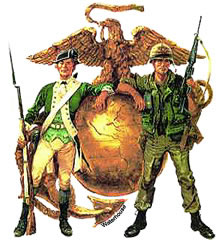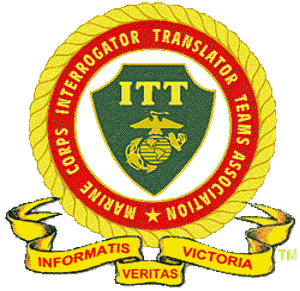Marine Corps
Interrogator Translator Teams Association
Home | Gatherings |
Memorial |
History |
ITT's |
Bulletin Board |
Gear Locker |
Links
United States Marine Corps Inter

Graphic courtesy of Colonel Charles Waterhouse USMC (Ret)
www.usmcartist.com/
History is the witness that testifies to the passing
of time; it illumines reality, vitalizes memory, provides guidance in
daily life and brings us tidings of antiquity.
Cicero, Pro Publio Sestio
Each year we Marines bear witness to our ancestry and mark our history on
10 November. Our antiquity is rich with symbolism and metaphor that emboldens
our brotherhood of Marines. So too, we as Marine Interrogators shall strive
to identify our core essence and preserve the history of the Interrogator
Translator Teams to witness our place in Marine Corps history.
Our endeavor to research and write the history of the Interrogator Translator
Teams and the Marine Interrogator is vital.
We encourage all Marine Interrogators to submit any historical information
and their personal accounts. Team Histories, photos, articles, anecdotal accounts
and personal histories are all items of great interest and importance.
We prefer material to be submitted in digital form, but will gladly convert
and return to you any hard copy you may have. We will post these accounts
and historical documents to this website and compile a history of the Marine
Corps Interrogation field for final repository with the Marine Corps University
at Quantico.
This is an ongoing project that will be pursued with attention to accuracy,
and will be refurbished as time passes and new information becomes available.
Although we look for historical fact, the anecdotal stories of those who were
there are most vital to the complete understanding of what it was like and
what happened.
The history of the ITT’s has never been comprehensively recorded. It is incumbent
upon all of us to do so with diligence. In the words of Sir Winston Churchill,
"History will be
kind to me for I intend to write it." So too we must ensure
that our history is noted and done correctly by us, lest it be left to those
who did not witness it and who would treat us unkindly.
Writing history is a guessing game
at best, but without such ad hoc judgments, we cannot make sense of the past,
of current events nor, most important, of the future.
Professor Manfred Weidhorn, Yeshiva University, 1993
*****
History of ITTs
Letter from Doug
Brower
Letter from the MCITTA Historian
Marine Interrogator-Translators can be
traced back to it's roots when the first Interrogator-Translator Teams (ITT's)
were formed in 1959. That year saw the formation of the
2d Composite ITT
in Camp Lejeune, NC.
Force Troop Order 5450.22
established the 2d
Composite ITT in Camp Lejeune, NC. Although the
formation of the 1st ITT was discussed at this time, it
wasn't until 1961 that the 1st ITT was
formed under the Fleet Marine Forces Pacific Headquarters
(FMFPacHQ) in Hawaii.
The roots of the Marine Corps
Interrogator-Translator (IT) go back much further than
1959. In fact, Marine linguists can be traced back to
before WWI; however, those Marines traditionally known
as interrogators were first trained just prior to and
during WWII.
IT Marines primarily relied on
the US Army to provide training to them at the
Interrogation of Prisoners of War (IPW) Courses. During
WWII this training was provided at Camp Ritchie, Camp
Savage, and at The Presidio of San Francisco (among
other places, see
World War II Interrogator History
).
During WWII Marines were not
specified by Military Occupational Specialty (MOS) as
Interrogator-Translators (IT), but generically known as
Intelligence Marines. Those Marines who spoke the
language were, by default, tasked to perform the mission
of interrogation. It was also at this time that the
development of the MOS Language Officer developed.
During the Korean War, again,
there were no designated interrogators within the Marine
Corps and the mission of interrogation was carried out
by Intelligence Marines or Intelligence Analysts. Many
of them performed this mission through native language
interpreters.
It wasn't until the Marine
Corps' first involvement in Lebanon (in the late 1950's)
that the Marine Corps decided to develop a program and
MOS dedicated to training linguists and instituting
tactical interrogation skills as part of the Marine Air
Ground Task Force (MAGTF) concepts then in development.
At this time (in the late 1950's and through the 1960's)
IT Marines still relied on the US Army for IPW training
at Camp Holabird, MD.
Although we know that the first
two ITT's were formed in 1959, the MOS itself has a
murky beginning. It was first designated by the
secondary MOS of 8631 Interrogator-Translator (IT). The
training for MOS 8631 included that of Intelligence
Analyst (MOS 0231), so that all IT Marines were
designated by that MOS (0231/8631). The earliest entry
of a designator for professional Marine Corps
Interrogators is referenced in the USMC MOS Manual 1954
(Revised) which does list "MOS 8631 (W)
Interrogator-Translator (Designated Language)". Later,
in the early 1960's the MOS became a primary MOS 0261
Interrogator-Translator. The Language Officer MOS was
also designated as MOS 0270 at this time. Language
Officers typically served as Officer-In-Charge of the
ITT's. It was also during this time that the
development of Interpreter Teams were developed.
Interpreter Teams were linguists not trained in
interrogation and held the secondary MOS of 8611. Much
discussion was made of these terms (interrogator vice
translator vice interpreter) and a determination was
made that interpreters were not always to be trained as
interrogators. Later, in the Vietnam War, Interpreter
Teams were formed to accompany ITT's and provide
language support. In some instances these Interpreter
Teams consisted of allied troops (i.e. Army of the
Republic of Vietnam- ARVN troops).
(Note- The designator 8631 later
became a Sensor Management Maintenance Specialist and 0261
later became Topographic Intelligence Specialist. When
exactly the MOS 0250 and 0251 became the designated
primary MOS is still being researched).
By the time that the Vietnam War
began, the ITT were well established within the combat
units. During the Vietnam War the numbers of ITT's grew
exponentially. The exact number of ITT's is still being
researched at this time, but at least nine ITT's had
stood up prior to or during the Vietnam War (1st, 2nd,
3rd, 5th, 7th, 9th, 11th, 13th,15th and 17th).
After the Vietnam War, the
MOS and the ITT's began to consolidate as the force size
grew smaller and more and more the ITT's were rounded up
into the headquarters elements under "umbrella" (or
parent) organizations of the Marine Amphibious Forces
(MAF). These organizations developed into the
Interrogator-Translator Units (ITU's) within the Marine
Expeditionary Forces (MEF's). The ITT's were formed up
under these parent organizations (within the G-2).
Training for the IT Marines was
done primarily through the US Army Schools (first at
Camp Holabird, and then to Ft Huachuca, AZ).
In 1989 the Marine Corps
established it's own IPW Course at the Navy and Marine
Corps Intelligence Center (NMITC) at Dam Neck, VA.
It also during this time (1988)
that the 0250 disappeared from the rolls of the IT
Marines (exact date and circumstances being researched
at this time). It appears that the 0250 was the victim
of officer realignment conducted at this time. The
0250, being a relatively "young" MOS was one of the
first to be removed.
In the early 1990's the ITT's
became part of the short-lived Surveillance
Reconnaissance Intelligence Groups (SRIG's) which formed
in each MEF. Within the SRIG Intelligence Companies
formed (hence, the formation of Interrogator-Translator
Platoons- ITP's- which replaced the ITU). Later, with
the dismantling of the SRIG (in the mid-1990's) the
ITT's became part of the new Intelligence Battalions
within the MEF's. Throughout the 1990's the MOS became
severely under strengthen (at one point at 47%). With
the advent of the smaller numbers, fewer ITT's were
maintained (although not removed from the USMC
Organization). Or ITT's were so undermanned that an ITT
may have consisted of five people (the normal strength
throughout was approximately 12 personnel). This
eventually lead to the "ITT" as no longer a reference
for Marines. Most of the IT Marines were simply
assigned to the ITP and many (even though by T/O they
were assigned to an ITT) did not realize they were a
member of an ITT.
The MOS commonly referred to as "0251 Interrogator-Translator" or "0250
Interrogator-Translator Officer" existed from 1958 until
its merger with the 0211 MOS in 2002.
The United States Marine Corps
Military Occupational Specialty (MOS) 0251 came to an
unceremonious end with MARADMIN 560/02 MSG 220730Z OCT
2002 that announced that the “MOS 0251 has been deleted
from the active duty component".
As we work to research and compile our history there has been
established the ITT Listings (see below) to publish the information from the various
members of the different ITTs. Please contact
Warren Smith directly to add material, or
contact me to comment
about your experiences so that I can set up a page and/or links to
your information. Some information has been submitted and posted at the
various ITTs.
I welcome any and all comments & photos about any of the
ITT's that you wish
to have posted. I am setting up web pages to List all on the respective
pages. Please check out my page: Frank Signorile
Updated:08/27/20
Questions, comments, changes and/or additions:
Contact Frank Signorile



